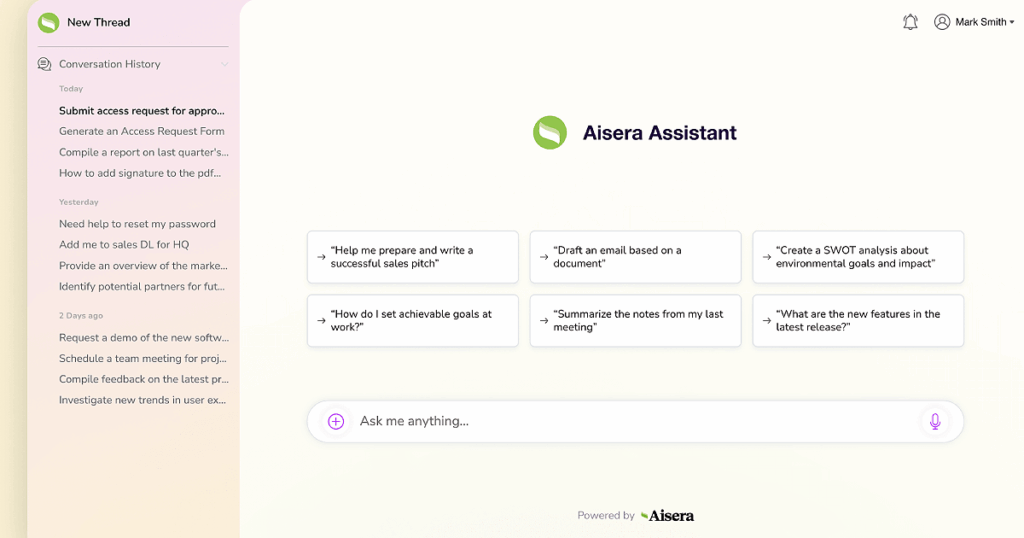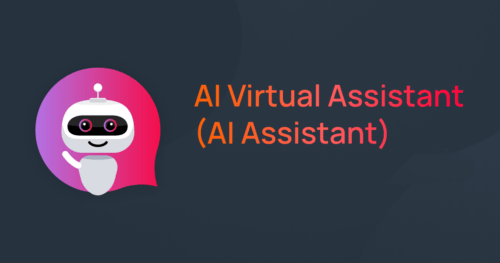What Are AI Assistants?
An AI Assistant, also known as a virtual assistant, is a software application that uses artificial intelligence to talk to users in natural language, via text or voice. It uses natural language processing (NLP) to understand questions, context, and respond with human-like answers.
Modern AI personal assistants go beyond just commands. They integrate analytics and cognitive computing, using user data, previous interactions, location, and organisational knowledge to provide personalised intelligent support, whether for personal use or workplace productivity.
How AI Assistants Work: The Technology Behind Them
AI assistants are a form of conversational AI that uses a combination of advanced technologies to understand and interact with humans. To understand their sophistication, it helps to break down the core technologies.
- Natural Language Processing (NLP) & Natural Language Understanding (NLU): Think of these as the assistant’s “ears” and “brain. Leveraging NLP in virtual assistants enables them to process and interpret human language (spoken or written), while NLU allows it to understand the intent, not just the keywords. This is why you can say, “I need to grab coffee with John next Tuesday,” and the assistant knows to schedule a meeting, not just search for the words “coffee” and “John.”
- Large Language Models (LLMs): These are the foundation of modern AI assistants. LLMs, such as Gemini or GPT, are trained on vast datasets of text and code, giving them a broad knowledge base and the ability to generate human-like, context-aware responses. They are what allow the assistant to hold a coherent conversation, summarize information, and even brainstorm ideas.
- Machine Learning (ML): This is the assistant’s ability to “learn” and improve over time. Through machine learning, the AI assistant analyzes past interactions to refine its responses and predict user needs. The more you use it, the more personalized and accurate it becomes.
AI Assistants are Powered by Conversational AI
AI assistants are a form of Conversational AI, a technology that allows machines to talk to humans. These assistants work on a combination of AI models, NLP, machine learning, and, in more advanced cases, agentic AI. Together, these capabilities allow AI assistants to process natural language inputs, understand intent, and generate intelligent context-aware responses.
A modern Conversational AI platform increases automation and helps service teams be more productive and reduce operational costs. New advancements are turning traditional chatbots into next-gen AI assistants like Aisera’s AI Assistant, which uses Agentic AI to operate autonomously, adapt in real time, and solve multi-step problems with minimal human intervention.

AI Assistant vs. Chatbot: Understanding the Key Difference
While the terms are often used interchangeably, there’s a key difference in their functionality, technology, and purpose. Think of a chatbot as a specialized tool, while an AI assistant is a versatile personal helper.
| Feature | Chatbot | AI Assistant |
| Primary Purpose | Automate responses to predefined queries (FAQs, support tickets) | Complete multi-step tasks, provide proactive support, and manage workflows |
| Technology | Often uses rule-based logic or basic NLP to match keywords to scripted responses. | Leverages advanced NLP, NLU, and Large Language Models (LLMs) to understand context and intent. |
| Context Awareness | Limited to the current conversation or session. Treats each interaction as a new query. | Maintains context across multiple interactions and can recall past preferences. |
| Learning Ability | Limited or non-existent. It relies on its programmed rules and responses. | Continuously learns from every interaction to provide more personalized and accurate results over time. |
| Functionality | Handles single, transactional tasks like “What are your store hours?” or “Track my order.” | Manages complex, goal-oriented tasks, such as “Schedule a meeting with the team next week,” or “Summarize yesterday’s sales report.” |
| Example Use Case | Answering a customer’s question on a website’s live chat. | Managing a calendar, drafting emails, and controlling smart home devices. |
In summary, the difference between AI assistants and chatbots goes beyond just features. It’s about their approach to a problem.
A chatbot is a reactive system. It waits for a user to ask a question and then responds based on its rules or a limited knowledge base. But an AI assistant, especially one powered by agentic AI, is a proactive and goal-oriented partner. It can operate independently, anticipate user needs, and orchestrate complex tasks across multiple apps without continuous human input.
This proactivity, combined with the ability to maintain context over long periods of time, allows AI assistants to be an extension of a user, not just a tool for simple answers.
Types of AI Assistants
AI assistants are not a one-size-fits-all solution; they come in various forms designed to serve different functions, from personal use to specialized business roles.
Personal AI Assistants
These are the most familiar to most people, integrated into everyday devices to help with daily tasks. AI personal assistants are software programs that use artificial intelligence to do daily personal tasks. They can be text assistants, voice bots, or a combination of both. For example, Siri and Alexa fall under this category.
- Examples: Apple’s Siri, Google Assistant, Amazon Alexa.
- Key Functions: Setting alarms, providing weather updates, playing music, controlling smart home devices, and answering general knowledge questions.
AI Voice Assistant
When it comes to voice assistants, there are various tools available, ranging from free plans to premium versions, such as Aisera’s AI Voice Bot for enterprises. You may wonder what AI voice assistants are and how they differ from AI text-based assistants. AI voice assistants and text-based AI assistants are two forms of AI technology designed to streamline human-computer interaction.
Virtual assistant voice services like Google Assistant, Alexa, or Apple’s Siri utilize an AI voice bot with speech recognition technology to interpret and respond to verbal prompts and voice interaction. They transform spoken commands or voice queries into actions, offering hands-free convenience ideal for multitasking or accessibility purposes.
Conversely, AI text assistants such as Conversational assistants or virtual agents leverage natural language processing to understand and reply to written prompts. They are widely implemented in chatbots and AI customer care bots, assisting in tasks such as email drafting and instant messaging.
AI voice assistants are now using multilingual conversational AI, which is why we see them in different countries. For example, the government of India has developed a project named GoVocal AI, an Indian AI voice assistant that works like Alexa or Google Assistant but in the Hindi language.
The main difference is in the mode of communication: voice assistants are auditory and speech-based, text assistants are visual and text-based. This difference is due to various user needs, contexts, and preferences, and ultimately, the diverse AI application landscape. But both are moving towards more conversational and natural human-computer interaction.
We all have experienced at least one of the personal assistant AI examples below:
1. Apple Siri:
Siri is one of the most popular virtual assistants. Siri is an AI-powered digital assistant on iPhones, iPads, and Macs. You can do many things with voice commands, like set reminders, send messages, make calls, and search the web. Siri also integrates with other apps and services on Apple devices for a seamless and personalized experience.
2. Amazon Alexa:
Amazon Alexa is a popular virtual assistant in Amazon Echo speakers. You can do many things like play music, get weather updates, control smart home devices, order products from Amazon, and answer general knowledge questions. Alexa’s skills can be expanded through third-party integrations, so it’s a very versatile and customizable virtual assistant.
3. Google Assistant:
Google Assistant is available on Android devices and Google Home speakers. It has many key features like voice-controlled search, personalized recommendations, smart home control, meeting scheduler, and access to various Google services. Google Assistant is known for its natural language processing for text and speech recognition, and can understand the context for more conversational interactions.
Enterprise/Work AI Assistants
These assistants are built for business environments to automate workflows, improve collaboration, and manage information.
- Examples: Microsoft 365 Copilot, Amazon Q.
- Key Functions: Summarizing documents, drafting emails, scheduling meetings, and providing data insights directly within workplace tools like Slack or Microsoft Teams.
Specialized AI Assistants
This category includes assistants designed for a specific purpose or industry. Highlighting these shows your article’s depth and addresses niche user queries.
- Customer Service AI Assistants: Automate customer interactions, answer FAQs, and provide 24/7 support.
- AI Writing & Content Assistants: Assist with drafting emails, generating blog posts, and brainstorming ideas.
- AI Coding Assistants: Offer code suggestions, debug, and write code snippets to accelerate development.
- AI Sales & Marketing Assistants: Automate lead management, optimize outreach strategies, and provide data insights to sales teams.
- AI HR Assistants: Streamline onboarding, answer common HR questions, and automate administrative tasks like expense reports.
How AI Assistants Boost Productivity
Solving Problems and Streamlining Workflows with AI Assistants
AI assistants are more than just tools; they are problem-solvers. The real power of an AI assistant lies in its ability to understand a user’s intent and autonomously execute complex, multi-step tasks to achieve a specific goal. This is known as agentic AI, and it’s a key differentiator from simpler chatbots. Instead of just answering a question, an agentic AI assistant can orchestrate a series of actions across different systems to get the job done.
For example, a user could ask an AI assistant:
“Summarize yesterday’s sales report, draft a follow-up email to the team highlighting the key wins, and then schedule a short meeting for next Tuesday to discuss Q4 strategy.”
A traditional chatbot might only be able to provide a link to the sales report. However, a modern, agentic AI assistant would perform all three of these actions seamlessly:
- Information Retrieval: It would access the sales data from a connected CRM system.
- Content Generation: It would use a Large Language Model (LLM) to write a concise, professional email summary.
- Task Automation: It would access your calendar and email platform to schedule the meeting and send the draft email for your final review.
This ability to act as a digital orchestrator is what makes AI assistants so valuable. They don’t just provide information; they reduce the cognitive load and manual effort required to complete a task, turning a simple query into a chain of productive actions.
– Boosting Personal Productivity
In our personal lives, AI assistants are digital organizers, simplifying daily routines and freeing up mental space. They help manage the complexity of modern life so you can focus on what matters.
- Smart Scheduling and Time Management: AI assistants are calendar masters. They can schedule appointments, set reminders for deadlines and events and even find the best times for meetings based on your habits so you never miss a thing.
- Effortless Email and Communication: They can tackle an overflowing inbox by sorting emails by priority, summarizing long threads into key points and drafting quick replies. So you can cut through the noise and respond to important messages faster.
- Automating Daily Tasks: From setting alarms and timers to controlling smart home devices like lights and thermostats, AI assistants automate dozens of small daily tasks. They can also manage to-do lists, digital files, and even help with meal planning or creating shopping lists.
- Instant Information Retrieval: Instead of searching through notes or files manually, you can just ask your assistant to find what you need. They can pull up documents, find past conversations, or answer quick questions for you, saving you time.
– Boosting Work Productivity
In the workplace, AI assistants move from personal organizers to work BFFs, driving efficiency and competitive advantage across the company.
- Automate Repetitive Business Tasks: AI assistants are a game-changer for automating tasks like data entry, invoicing, reporting and CRM updates. Employees can offload boring tasks and focus on creative and high-value work that requires thought.
- Streamlined Communication and Collaboration: AI tools can transcribe meetings in real-time, generate summaries with action items and automate follow-up emails. For global teams, they can provide real-time translation, breaking down language barriers and creating a more cohesive work environment.
- Data-Driven Decision Making: By analyzing large datasets quickly, AI assistants can surface trends, insights and anomalies that would otherwise be missed. Leaders get the data-driven intelligence to make smarter, more informed decisions.
- Specialized Assistants for Specific Roles: The modern workplace has many specialized AI assistants for different functions:
- Developers: GitHub Copilot suggests code and accelerates development.
- Sales Teams: Gong AI analyzes sales calls to provide coaching and insights.
- HR & Recruiting: Paradox AI automates candidate screening and scheduling.
- Customer Success: ChurnZero helps teams anticipate customer needs and reduce churn.
- Finance: Stampli automates accounts payable.

Benefits of AI Assistants and Key Features
Boosting Workplace Productivity
Advanced AI virtual assistants are sometimes called AI assistants. They take over the routine tasks that eat away at employees’ time, freeing them up to focus on the work that really matters. That means more time for creativity, strategy, and innovation. And a more motivated workforce. That’s where you see real productivity growth. The AI employee experience is all about making that happen and improving employee satisfaction and engagement in the process.
Cost Savings through Automation
Cost savings through automation are a no-brainer. By taking over customer service tasks, virtual assistants reduce the need for so much human labor. That means businesses can streamline operations and save money without sacrificing service quality.
24/7 Customer Service
Around the clock customer service is a given with AI assistants. That means customer inquiries get answered whenever, wherever. And that consistency builds trust. Strong customer relationships are built on reliability and trust. Today, AI assistants are everywhere-from professional software to social media platforms. That means seamless omnichannel customer service.
Enhancing Customer Experience
AI customer experience is a capability of AI virtual assistants that not only meets customer needs efficiently but also enhances overall satisfaction. By delivering prompt and accurate support, businesses can significantly improve their customer service, leading to improved customer retention and loyalty. This 24/7 support system ensures that businesses are always there for their customers, creating a positive and enduring customer experience.
Hassle-Free Integrations
AI assistants work with your existing workplace tools like project management software, email platforms, and collaboration apps. For example, they can assign tasks in project management tools, generate AI-powered email responses, or analyze data in spreadsheets. This integration means employees can access AI right within their existing digital environment, reducing context switching and increasing productivity.
Knowledge Discovery and Information Retrieval
AI assistants help with knowledge discovery by aggregating information from multiple sources like employee handbooks, knowledge repositories or system data. Employees can ask natural language questions and get the answer quickly, reducing time spent searching for resources. This is especially useful in large organisations where information is spread across systems, so employees can make decisions and get tasks done faster.
Simplify Approvals and Workflows
AI assistants can automate multi-step processes like expense approvals, timesheet submissions, or IT ticket resolutions. By consolidating notifications and allowing employees to review and approve requests in one place, these tools reduce email clutter and simplify complex workflows. This saves time and increases departmental efficiency in HR, finance and IT.
Collaboration in Hybrid Workplaces
In hybrid work environments, AI assistants facilitate collaboration by providing real-time project updates, task assignment,s and communication. They can generate comprehensive status reports based on workflow data, so remote and in-office teams are aligned. This is key to productivity and transparency in distributed teams.
Privacy and Security
Privacy is a big barrier to AI adoption. AI assistants need access to sensitive data, and if not managed properly, can be a risk. Training data biases can lead to unfair outcomes. Organizations need to have robust security within agentic AI system with transparent data policies and bias mitigation strategies for ethical and responsible AI use. Clear regulations and user education are key to building trust.
Measuring Productivity Gains
Measuring the impact of AI assistants is key to justifying the ROI with AI. Organizations can track metrics like time saved on repetitive tasks, reduced response times, or improved task completion rates. For example, studies show AI users save over 30 minutes a day, and programmers using AI code twice as many projects a week. Implementing rating systems for AI interactions will help validate the value.
The Role of AI Assistants Across Industries
AI virtual assistants are transforming various sectors in different roles, from IT specialists to project management, including:
- Healthcare: LLMs in healthcare are being utilized extensively nowadays. Conversations AI is used to schedule appointments, remind patients to take medication, and even offer basic health advice. They can also analyze patient data to provide personalized care.
- Banking: Utilizing generative AI in the banking sector, as an AI virtual assistant, is also very common now. with account inquiries, transaction alerts, and fraud detection. They also provide financial advice based on users’ spending habits.
- Education: Digital assistants help personalize the learning experience, provide learning resources, and answer student queries. They also assist teachers in grading and administrative tasks.

Best AI Assistant for Enterprise
In the era of AI assistants, AI agents are transforming our interactions with technology in profound ways. When it comes to the best AI assistant list, Aisera Shines. Aisera delivers an AI Service Management (AISM) solution that leverages advanced Conversational AI and automation to provide an end-to-end Conversational AI Platform. These advanced AI capabilities automate tasks, actions, and workflows for ITSM, HR, Facilities, Sales, Customer Service, and IT Operations.
Aisera Assistant
Aisera Assistant is an enterprise-grade AI assistant designed to work seamlessly within the tools and apps your teams already use. Think of it as your AI ally – one that understands context, takes action, and delivers real results without switching screens or systems.
With Aisera Assistant, users can instantly access the right information and complete tasks through self-service, all powered by deep system integrations and real-time automation. It boosts productivity by anticipating user needs, orchestrating workflows, and eliminating manual effort. By proactively resolving issues, reducing MTTR, and maximizing auto-resolution, Aisera Assistant helps cut support costs while delivering exceptional user experiences. It’s omnichannel, multilingual, multi-modal, proactive, and fully autonomous – built to transform how work gets done across the enterprise.

Ethical Considerations in the Use of AI Virtual Assistants
AI assistants, while offering numerous advantages, also come with some challenges. Despite advancements in AI, virtual assistants can still struggle with complex tasks and may require human intervention. Additionally, there can be a lack of personal touch that only humans can provide.
One of the main concerns is privacy. AI virtual assistants often require access to sensitive data to function effectively, which may pose a risk if not properly managed. It’s essential that adequate security measures are in place to protect this data and that users are made aware of how their data is used.
Moreover, as AI virtual assistants often learn and adapt from interactions, they may unintentionally reinforce biases present in the data they are trained on. This highlights the need for robust and unbiased training data.
As AI virtual assistants become more advanced, they will be making more decisions on behalf of humans. This brings up questions about responsibility and accountability. For instance, who is to blame if an AI assistant bot makes a mistake or causes harm?
To ensure the responsible use of AI assistants, a combination of clear regulations, transparency from AI developers, and informed users is necessary. Developers should strive to create AI that respects users’ privacy, values, and rights. Users, on the other hand, need to be informed about the capabilities and limitations of AI assistants and how to use them responsibly. The reliability of the company providing the virtual assistant is a key factor to consider.
From Conversational AI to AI Agents
That’s where conversational AI comes in. But not all chatbots use that technology. In old assistants, there were two types of chatbots: the simple task-oriented kind and the more advanced, data-driven and predictive kind, also known as virtual assistant chatbots.
Conversational AI assistants or enterprise chatbots are context-aware bots that use NLU, NLP, and machine learning to get smarter as they go. They can personalize conversational flows and responses based on user profiles and other information they have. They can even remember your preferences and offer solutions and recommendations, or predict what you might need next. Some advanced AI copilots can proactively initiate conversations, guide users through complex processes, or offer timely support.
AI assistants can pull information from each conversation and aggregate that to answer a question or complete a task. With AI assistance, they keep the context right where it should be. Domain-specific AI agents take this a step further by leveraging specialized knowledge to enhance accuracy and provide tailored responses in specific environments, like IT or customer support.
That’s where the real power of virtual assistant technology comes in. By connecting those single-purpose chatbots under one umbrella and integrating AI copilots and AI agents, AI assistants can make all of them more effective. And that video we’re promoting will show you just how far chatbots, AI copilots, and task-oriented virtual assistants have come in conversational AI.
The Future of AI Virtual Assistants (Digital Assistants)
As we continue to innovate and push the boundaries of AI, the future of digital assistants is looking bright. Expect advancements like emotion and automatic speech recognition, more nuanced conversations, and improved personalization.
Increased Autonomy
As AI evolves, expect your virtual assistant to become even more independent, learning from past interactions to predict and perform tasks without needing to be asked.
Enhanced Personalization
AI-Powered Virtual Assistants of the future will likely be even better at learning our preferences, habits, and routines, enabling them to offer more tailored assistance.
Conclusion
AI virtual assistants, empowered by advanced AI technologies like Natural Language Processing (NLP) and Large Language Models (LLMs), are fundamentally transforming our interactions with technology. By providing personalized, human-like responses and automating a wide range of tasks—from simple daily routines to complex enterprise workflows—these assistants significantly enhance productivity and efficiency.
As technology continues to evolve, the future of AI assistants points toward even greater integration, autonomy, and personalization. They are becoming more than just tools; they are evolving into intelligent partners that can anticipate needs, streamline complex processes, and offer continuous, seamless support. This ongoing evolution promises to further revolutionize our digital experiences, making them more intuitive, efficient, and deeply integrated into our daily lives.


